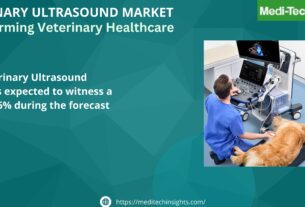
Global Healthcare Revenue Cycle Management (RCM) Market Overview
The global Healthcare Revenue Cycle Management (RCM) Market is projected to expand at a rate of approximately 11–12% by 2027.This anticipated growth is being fuelled by the rising demand for workflow optimization within healthcare facilities.
Regulatory pressures and government-backed initiatives encouraging digital transformation in healthcare processes are also accelerating adoption.
Key Request a free sample copy or view report summary: https://meditechinsights.com/healthcare-revenue-cycle-management-market/request-sample/
The shift toward cloud-based RCM deployment, combined with increasing strategic collaborations among healthcare organizations, IT vendors, and service providers, further contributes to the market’s expansion.
An additional driver of market growth is the persistent revenue loss experienced by healthcare organizations due to billing inaccuracies and falling reimbursement levels, prompting providers to seek more efficient, automated RCM systems.
Understanding Healthcare Revenue Cycle Management
Healthcare Revenue Cycle Management refers to the end-to-end process of identifying, capturing, billing, and collecting revenue owed to a healthcare provider for patient services.
A streamlined RCM workflow ensures that the organization maintains its financial stability while continuing to offer high-quality medical care.
It encompasses patient registration, insurance eligibility verification, coding, claim submission, payment posting, and denial management.
As healthcare becomes more complex and value-driven, the need for a precise, automated revenue cycle system becomes increasingly essential.
Growing Potential of Outsourcing in Healthcare RCM
The rising demand for RCM outsourcing is becoming a major factor boosting market growth.
Outsourcing allows healthcare organizations to leverage advanced technologies and skilled expertise without the expense of building internal capabilities.
These partnerships deliver smoother workflows, reduced administrative burden, fewer billing errors, and faster reimbursements.
Hospitals that lag behind in technology adoption often partner with experienced outsourcing firms that offer AI-driven analytics, automated billing platforms, and enhanced denial management support.
As a result, organizations can reallocate staff to patient-focused services while leveraging third-party RCM providers to manage complex billing operations efficiently.
Furthermore, digitally enabled modular RCM solutions offered by outsourcing companies are helping healthcare systems modernize their entire revenue cycle process.
Increasing Adoption of RCM Solutions Globally
An effectively managed revenue cycle is central to the operational performance of hospitals, clinics, and healthcare networks.
Implementing healthcare RCM solutions helps organizations boost cash flow, minimize revenue leakage, streamline administrative processes, and elevate patient satisfaction.
These systems support regulatory compliance and provide greater transparency in billing operations.
Clinically integrated RCM platforms enable providers to minimize claim denials, increase clean claim submission rates, and reduce the rework associated with incomplete or incorrect claims.
As healthcare delivery continues to grow in complexity, the global demand for advanced RCM systems is set to rise consistently in the coming years.
Key Technology Trends Transforming the Healthcare RCM Market
Automation is becoming one of the most influential trends in the RCM landscape.
Automated claim submission, eligibility verification, coding assistance, and denial follow-up help healthcare organizations reduce manual errors and save valuable administrative time.
Automation ensures that claims move through the cycle faster while enhancing overall patient satisfaction.
Data analytics is emerging as a vital tool in optimizing RCM operations.
Healthcare providers are increasingly relying on AI, cloud platforms, machine learning, and predictive algorithms to detect revenue risks, identify bottlenecks, and manage compliance more proactively.
A stronger focus on patient-centric operations is reshaping the revenue cycle as patients expect more transparent billing, flexible payment options, and digital communication tools.
Improved patient engagement—supported by online portals, mobile applications, and automated reminders—helps reduce missed payments and enhances the financial performance of healthcare practices.
Payment reforms such as value-based care and bundled payment models continue to influence the RCM process.
As providers transition away from fee-for-service and adopt quality-driven payment structures, revenue cycle systems must adapt accordingly.
Challenges Impacting the Healthcare RCM Market
Despite strong growth, the market faces multiple challenges that could restrain its momentum.
High implementation and maintenance costs of advanced RCM systems remain a concern for smaller healthcare facilities.
Inadequate IT infrastructure in many developing regions makes modern RCM adoption difficult.
Frequent regulatory updates and complicated reimbursement rules require continuous adaptation of RCM systems.
Healthcare organizations also struggle with collecting payments from patients, especially as high-deductible health plans become more common.
Monitoring each claim throughout its life cycle and ensuring staff are adequately trained in the latest billing practices add further complexity.
Regional Insights: North America Continues to Lead
North America holds the largest share of the global healthcare RCM market.
The region benefits from widespread adoption of cloud-based systems, strong healthcare IT infrastructure, and early implementation of electronic health records.
The presence of leading RCM vendors and growing efforts to manage large volumes of unstructured healthcare data further strengthen the region’s market position.
Asia-Pacific, however, is emerging as a rapidly growing regional market.
Increasing patient inflow, expansion of health insurance coverage, and rising awareness of efficient billing practices are contributing to growth.
The region is also experiencing growing revenue leakage due to billing errors and declining reimbursements, driving healthcare providers to adopt robust RCM systems.
Competitive Landscape: Key Players and Market Strategies
The healthcare RCM market is marked by the presence of prominent global providers, including:
- The SSI Group LLC
- Veradigm Inc
- R1 RCM Inc
- McKesson Corporation
- Athenahealth Inc.
- Epic Systems Corporation
- Quest Diagnostics Inc.
- Cerner Corporation
- Constellation Software
- GE Healthcare
- eClinicalWorks
- NXGN Management LLC
- CareCloud Corporation
- AdvantEdge Healthcare Solutions
- Optum Inc
- Oracle Corporation
- Accenture plc
- Conifer Health Solutions LLC
Leading companies are employing a mix of organic and inorganic strategies to strengthen their market positions.
Partnerships, acquisitions, and continuous product innovation remain at the forefront of their expansion efforts.
For example, in January 2023, Optum partnered with Owensboro Health to enhance patient care and integrate RCM and IT services under a unified system.
In August 2022, R1 RCM Inc. entered a 10-year partnership with St. Clair Health to deliver end-to-end revenue cycle management services.
Such collaborations highlight the industry’s push toward sustainable, technology-driven revenue cycle improvements.
Future Outlook
The healthcare RCM market is expected to experience sustained growth due to rising demand for cost-effective digital healthcare solutions, expanding patient populations, and continuous advancements in automation and analytics.
With strong emphasis on efficiency, accuracy, and patient engagement, the industry will continue to evolve as providers adopt innovative technologies and strategic partnerships to optimize financial performance.
Key Request a free sample copy or view report summary: https://meditechinsights.com/healthcare-revenue-cycle-management-market/request-sample/
About Medi-Tech Insights
Medi-Tech Insights is a healthcare-focused business research & insights firm. Our clients include Fortune 500 companies, blue-chip investors & hyper-growth start-ups. We have completed 100+ projects in Digital Health, Healthcare IT, Medical Technology, Medical Devices & Pharma Services in the areas of market assessments, due diligence, competitive intelligence, market sizing and forecasting, pricing analysis & go-to-market strategy. Our methodology includes rigorous secondary research combined with deep-dive interviews with industry-leading CXO, VPs, and key demand/supply side decision-makers.

